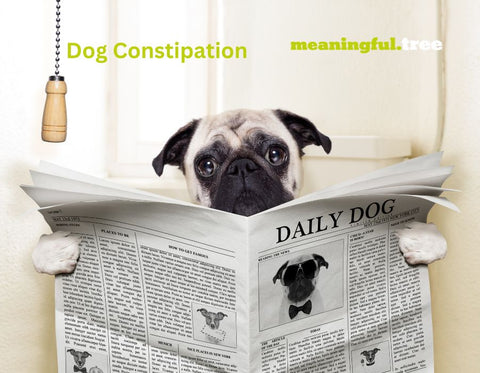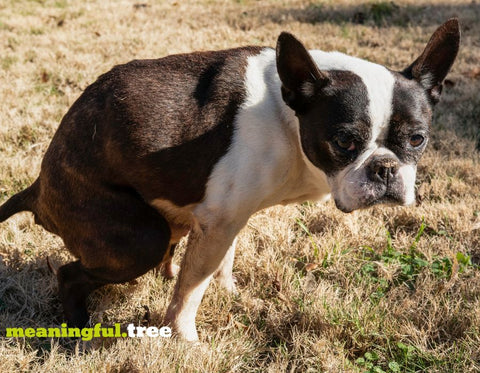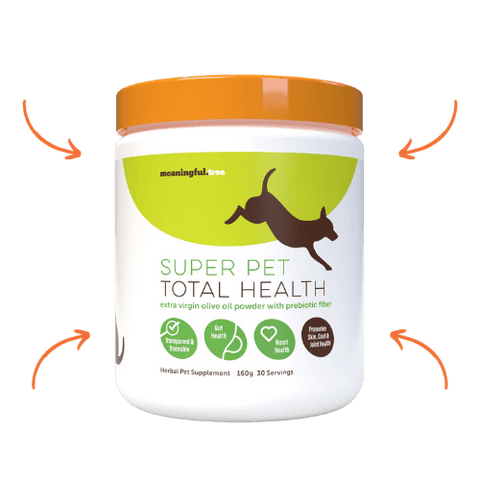Is your beloved furry friend plagued by constipation? Worry not, as we’ve got you covered with top remedies on what to give a dog for constipation. With simple yet effective home solutions, you’ll soon have your canine companion back on track to a happier, healthier life.
Try Super Pet Total Health for FREE, Just pay Shipping.
Key Takeaways
-
Recognize the symptoms of dog constipation and take appropriate action.
-
Home remedies such as hydration boosts, fiber-rich foods, oils for lubrication, probiotics and gut health supplements can provide relief from constipation in dogs.
-
Consult a veterinarian if your dog has not defecated in 48 - 72 hours or there are changes to their defecation habits. Feed them a balanced diet with adequate hydration & exercise to prevent future occurrences.
Understanding Dog Constipation

When it comes to dog constipation, a normal stool that is passed on an appropriate schedule indicates a healthy digestive tract. When this system fails to function properly and the animal starts showing symptoms such as decreased appetite, weight loss or constant squatting & circling, then immediate action should be taken in order to recognize chronic constipation before any complications arise, which could include renal problems and enlarged prostate due to diet factors.
It’s very important for owners of furry friends with signs of being backed-up to pay attention both while observing their pet’s bowel movements and take action accordingly by trying out some home remedies if needed. These can prove effective at relieving mild cases as well as getting them back up ‘n running again after proper assessment from the vet has been done first!
Fortunately, there are several treatments available that may help get your pup feeling better fast. Adding more fiber/pumpkin puree into their meals (with veterinarian supervision) might do wonders, but also ensuring they’re hydrated enough or increasing exercise levels have had positive results too! Certain medications prescribed by vets can clear severe blockages within dogs suffering from constipation issue over time without causing future discomfort either down the line.
Top Home Remedies for Dog Constipation Relief

To help your pet with constipation, it is essential to make sure they stay hydrated. Adding fiber-rich foods and natural supplements such as a stool softener can also be beneficial. There are other options for lubricating the bowels including certain oils and probiotics that support gut health too! These remedies enable a more comfortable passage of waste, which should reduce the discomfort caused by constipation in dogs.
Hydration Boost
To keep your dog’s bowel movements regular and avoid constipation, they should have access to plenty of fluids. A good rule of thumb is one ounce for each pound the dog weighs per day. Options like canned pumpkin puree, water (fresh or bone broth), wet food with a bit of olive oil/coconut oil added in can help achieve this goal as well as provide variety which most dogs enjoy! Providing ice cubes from time to time may encourage more drinking up too. Having enough liquids will not only reduce the risk associated with constipation, but also support overall health benefits for your pup!
Fiber-Rich Foods
To maintain healthy digestion and reduce the chances of your dog developing constipation, it is important to make sure their diet includes enough dietary fiber. Consider adding pumpkin puree into the mix. This type of soluble fiber can help regulate digestive tract activity as well as soften stools. It’s recommended that you begin with 1-4 tablespoons when introducing pumpkin pie filling in its food intake. If needed, speak to a veterinary nutritionist if you would like more information on creating homemade meals for managing any potential constipation issues they may have. Overall, incorporating foods high in fibres such as leafy greens, whole fruits and pumpkins into their diet will go a long way towards boosting overall health and promoting good digestion.
Oils for Lubrication
Oils such as coconut, mineral or olive oil are useful in helping to alleviate constipation. By introducing these into your dog’s food it can help the digestive system by offering lubrication and softening stools. You should be careful with how much oil is given since too much may result in diarrhea. Typically, an amount of one teaspoon for every 20 pounds of bodyweight per day is recommended, but always ask your veterinarian before giving any supplements to ensure correct amounts.
By providing oils like those mentioned above, this might offer relief from canine constipation so they won’t have difficulty passing stool anymore while still keeping safety guidelines taken into consideration at all times.
Probiotics and Gut Health
Including probiotics, apple cider vinegar or other natural supplements in your canine’s diet is known to help keep a healthy gut microbiome and diminish the chance of developing constipation. Apple cider vinegar specifically has been shown to fortify beneficial bacterial colonies in their digestive system. It’s recommended that you seek advice from an animal doctor before introducing any new items into your pet’s eating routine just for safety reasons.
Exercise and Massage for Constipation Relief

Giving your dog an appropriate amount of exercise on a regular basis can help maintain healthy intestinal functions and stop constipation. Physical activity aids in the passage of fecal matter through its digestive tract into the colon, keeping proper performance levels for their digestive system. Providing soft abdominal massage may also improve digestion and reduce any issues connected to it like constipation as well as combine with physical exertion which benefits them more greatly overall.
When to Switch to Canned Dog Food
If your canine friend is still suffering from constipation, it may be beneficial to transition them to canned dog food. This type of meal provides increased moisture and improved appetite, which can help reduce the discomfort caused by backed-up bowels. Changing over to this style of eating must be done slowly in order not to upset their system.
Offering a gradual transfer into consuming canned diet will hydrate your pet while providing needed nutrients that could potentially prevent future issues with digestion complications such as constipation. It’s important for you to consult with a veterinarian before making any changes when deciding what sort or brand of food best suits your pup’s dietary requirements before serving up these new meals!
Warning Signs: When to Consult a Veterinarian

Home remedies can be a great option to help ease constipation in dogs, but if your pet hasn’t had a bowel movement within the 48-72 hour timeframe or exhibits any changes in their pooping routine, it’s important to consult with your vet. Your veterinarian will diagnose and recommend treatments for constipation which may include X-rays, an abdominal ultrasound scan as well as medications such as cisapride, lactulose and/or over the counter stool softeners.
Preventing Future Constipation in Dogs
It is important to observe and pay attention to your dog’s bowel movements, in order to help prevent constipation. You can do this by providing a balanced diet with fiber-rich foods such as pumpkin, carrots, kale and cabbage along with sufficient water intake for hydration. Encouraging regular exercise will aid the digestion process while stimulating healthy bowel movement habits.
These steps are essential for ensuring that your pup stays happy and healthy over time. If you have any doubts or questions concerning their digestive health, it’s best not hesitate in consulting veterinary advice right away.
Maintaining these tips on an ongoing basis helps avoid future constipation problems, making sure those furry friends of ours lead active life styles!
Summary
For your pup’s comfort and well-being, it is important to address their constipation issues. Home remedies such as providing extra hydration, giving fiber-rich food items, adding oils for lubrication, or introducing probiotics into the diet can all help promote good digestive system health in your furry friend. Get regular exercise and gentle massages will aid digestion which can ultimately keep healthy bowel habits maintained too, just remember to consult with a vet first if you are ever unsure about anything concerning constipation!
Want to try Super Pet Total Health for Free? Click Here.
Frequently Asked Questions
How can I relieve my dogs constipation fast?
Giving your pup a higher water intake and adding certain components to their diet like coconut oil, olive oil, canned dog food, pumpkin puree plus leafy greens and apple cider vinegar can help clear constipation problems rapidly.
What human medicine can I give my dog for constipation?
You can offer your canine companion Dulcolax tablets every 8 hours, up to four doses in total. Or blend Benefiber with their food (at a rate of one teaspoon for each 20 pounds) and/or mix canned pumpkin into the same.
How can I stimulate my dog to poop?
To encourage a healthy bowel movement in your pet, it’s important to provide them with wet food and dietary fiber supplements, as well as adding probiotics or digestive enzymes. Give them pumpkin puree and keep their bodies hydrated with plenty of fresh water. To complete the regime you can try gently massaging around their anus area using baby wipes in circular motions. Alternatively, some warm water enemas may do the trick too!
Does peanut butter help dogs with constipation?
For canines who are having difficulty with constipation, peanut butter may be useful in aiding the issue by lubricating their colon and making it easier to pass stools which have been softened.
What are some common causes of constipation in dogs?
Constipation is a frequent issue in canines that could be caused by slow digestion, dehydration, not enough physical activity or specific medicines.



